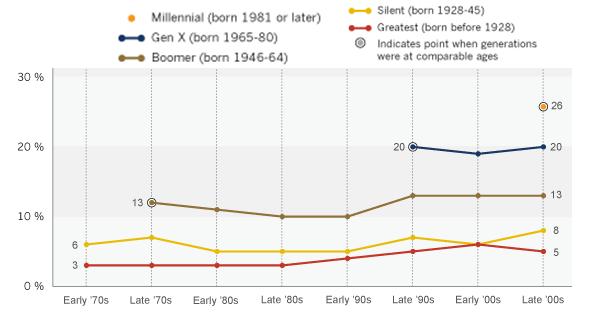Millennial Generation Less Religiously Active than Older Americans
— But Pew Forum Finds Young Adults To Be Fairly Traditional in Some Other Ways
By Pew Forum on Religion and Public Life
Percent unaffiliated with religion by generation

Washington, D.C. – By some key measures, Americans ages 18 to 29 are considerably less religious than older Americans, according to a new report released by the Pew Research Center’s Forum on Religion & Public Life. Fully one-in-four are unaffiliated with any particular faith. The report is part of a Pew Research Center series exploring the behaviors, values and opinions of the teens and 20-somethings that make up the Millennial Generation.
“Religion Among the Millennials,” based on data from a variety of sources including Pew Research Center surveys, explores the degree to which the religious characteristics and social views of young adults differ from those of older people today, as well as how Millennials compare with previous generations when they were about the same age. According to survey findings, Millennials are significantly more unaffiliated than members of Generation X were at a comparable point in their life cycle and twice as unaffiliated as Baby Boomers were as young adults. Young adults today also attend religious services less often than older Americans. And compared with their elders today, fewer young people say that religion is very important in their lives.
However, on some other measures of religious belief and practice, members of the Millennial Generation are not so clearly different from previous generations. For example, young adults’ beliefs about life after death and the existence of heaven, hell and miracles closely resemble the beliefs of older people today. The percentage of young adults who say they pray every day rivals the portion of young people who said the same in prior decades. Millennials also say they believe in God with absolute certainty at rates similar to those seen among Gen Xers a decade ago.
Key findings include:
* Compared with their elders today, young people are much less likely to affiliate with any religious tradition or to identify themselves as part of a Christian denomination. Fully one-in-four adults under age 30 are unaffiliated.
* One-third of those under age 30 say they attend worship services every week, compared with 41% of adults 30 and older.
* Fewer than half of adults under age 30 say that religion is very important in their lives (45%), compared with almost six-in-ten adults 30 and older (59%).
* Sixty-four percent of young adults say they are absolutely certain of God’s existence, compared with 73% of those 30 and older.
* Adults under age 30 are just as likely as older adults to believe in life after death (75% vs. 74%), heaven (74% each), hell (62% vs. 59%) and miracles (78% vs. 79%).
* Nearly three-quarters of affiliated young adults (74%) say there is more than one true way to interpret the teachings of their faith, compared with 67% of affiliated adults 30 and older.
The report, including a summary of findings, is available online.
The Pew Research Center’s Forum on Religion & Public Life conducts surveys, demographic analyses and other social science research on important aspects of religion and public life in the U.S. and around the world. As part of the Washington-based Pew Research Center, a nonpartisan, nonadvocacy organization, the Pew Forum does not take positions on any of the issues it covers or on policy debates. Funding for the Pew Forum is provided by The Pew Charitable Trusts.
Disclaimer: Articles featured on Oregon Report are the creation, responsibility and opinion of the authoring individual or organization which is featured at the top of every article.

